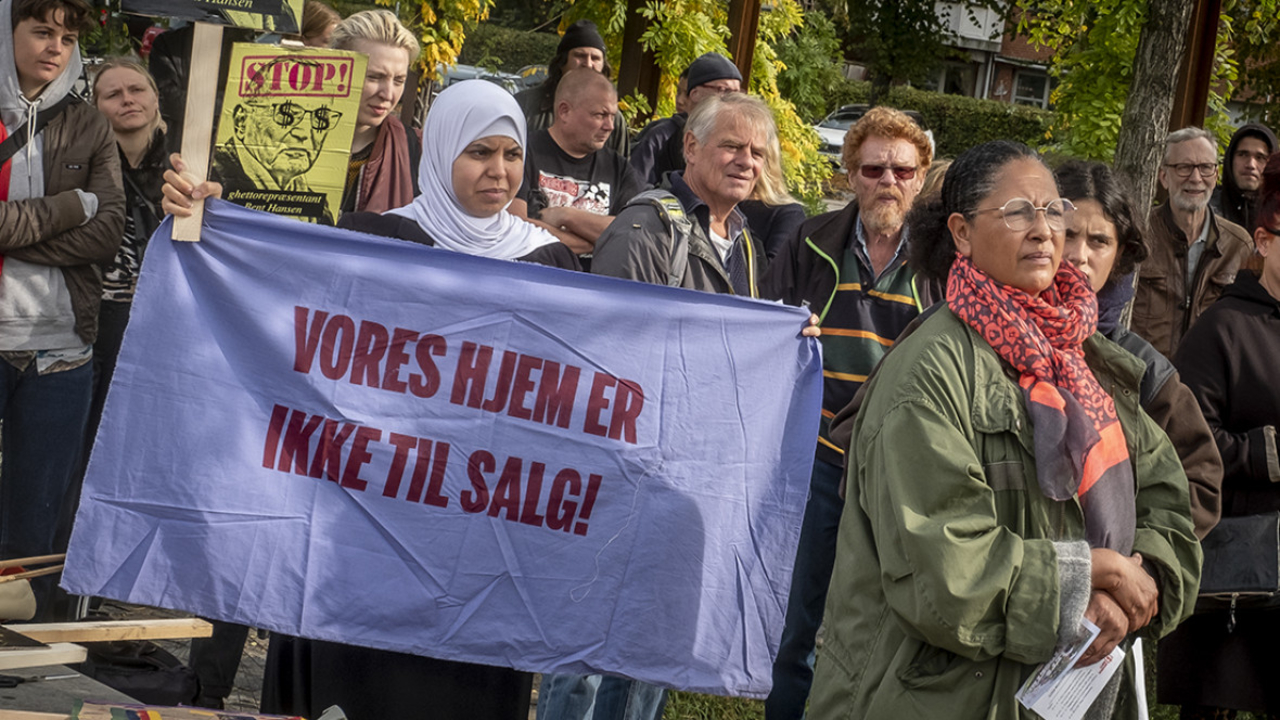On September 28, hundreds of people gathered in the Danish cities of Copenhagen, Aarhus, Odense and Helsingør to protest the ‘ghetto’ laws passed last year that can be used to target ethnic minorities. These laws encourage demolitions and forced foreclosures, as well as privatization of public housing in the country. In the aftermath of the law being passed, demolition plans have been formulated in multiple cities across the country. The call for the protest was given by Almen Modstand (Common Resistance), a movement formed to resist the racist ghetto laws.
According to Arbejderen (The Worker), around 600 people gathered for the protest at a park in Nørrebro, Copenhagen. Forming a human chain, they demanded the right to diversity and affordable housing. A cycle caravan was also organized from Mjølnerparken to Tingbjerg as part of the protest.
In March 2018, the government of Denmark presented an action plan with 22 proposals to remove all ‘ghettos’ in the country by 2020. The plan was approved in May 2018, ushering in related residential area regulations.
The Danish ministry of transport, building and housing has been publishing a ‘ghetto list’ since 2010. A ghetto has been defined as a particularly vulnerable public housing area, which lies within a Danish district, and is marked by social problems. The ghetto list mainly comprises residential areas which are largely inhabited by people of non-Western ethnicity. Progressive sections in Denmark claim that such a list to eradicate ghettos is racially motivated and directed against ethnic minorities and Muslim immigrants in the country.
Almen Modstand also said the ghetto laws are intended to snatch tenancy rights away from the people, leaving residential areas inhabited by them open to privatization. Physical demolitions and forced foreclosures will enable the government in doing thus, ultimately leading to a weakening or perhaps a complete closure of the general housing sector.
The movement has stated that such mechanisms undermine and override democracy by threatening the right of residents to influence decisions that affect their own residential areas. The government’s move is set to further isolate segments that already face the highest levels of discrimination in Danish society. The legislation also allows for the use of coercion and control for its enforcement. The use of such methods will further the social exclusion of those who possess the least in the country.
According to reports, the housing company Bo-Vita, which manages the Mjølnerparken residential area in Copenhagen, has decided to sell 226 public housing units in order to meet stipulations mentioned under the ghetto laws. The regulations require Mjølnerparken and the 14 other public housing areas on the government’s list of so-called ‘hard ghettos’ to cut the proportion of general family housing by 60% by the year 2030.
In Aarhus, the city council has called for the demolition of 900 public housing units. The city council of Odense has also decided to demolish 1,000 units out of the 2,900 homes in Vollsmose, while in Helsingør, 300 residents will be thrown out of their residences.
The Danish trade union Fagligt Fælles Forbund (3F) has expressed its support and solidarity with the ghetto dwellers in the country, and has called for a fight to ensure affordable housing.





